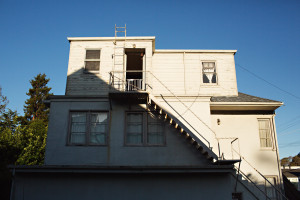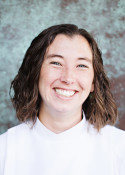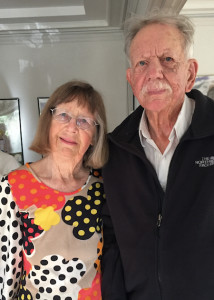From the Associate Rector
What will they say?
As I’ve sat with the horrible and senseless news of the massacre in Las Vegas this week – awful in large part because it’s no longer altogether surprising – I’ve been searching for some sort of cairn, a guide for how we live and move forward in such a world. Maybe ironically, my mind kept returning to a funeral that was wildly different from the ones that people will be gathering for in Nevada.
A few weeks ago, I had the joy of leading a celebration of the life of Georgia Becker, who joined All Souls in the 1950s. And it really was just that, a joy. A half an hour before the service began, the sanctuary was already filling up. It didn’t stop. People kept streaming in, well after we began, until the house was packed. To be honest, I was a little surprised. Not because Georgia wasn’t wonderful, but because it’s rare that at the age of 97 someone remains so connected with such a broad community.
If pressed, I might say that funerals are my favorite liturgy. Perhaps this is a strange thing to say in the wake of such violence this week. Of course I don’t like that we lose people we love, and I hate that sometimes it happens far too soon. But funerals, more than just about any other setting, strike me as a space where people can drop our acts of competition, our shields against vulnerability, and maybe most importantly, the myth that we are invincible. Funerals are a space where, if we are willing, we can be tremendously real and honest. This doesn’t always happen – it’s hard work; it can be tempting to slip back onto the safer ground of sugarcoated stories and empty euphemisms. But the invitation is there.
The invitation, I think, is not just to remember and give thanks for the life that has ended, but also to look at our own lives through that lens, the lens reminding us that our days will also come to an end. It’s the chance to hear how another person is remembered, and to wonder what it is that we will leave behind. With Georgia, I heard again and again how she always, without fail, remembered birthdays. How she used playful nicknames for everyone in her life – names like “Gumps” and “Fox.” How generous she was with her art and her sense of beauty.
After the service, I fell into conversation with another longtime All Soulsian who seemed both buoyed and perhaps a little disturbed by the remembrances we had just heard. It wasn’t because the words weren’t lovely and inspiring, but I suspect precisely because they were. He wondered aloud what people might say at his funeral. Absent the shenanigans modeled by Huck Finn, we can’t know, really. But I find it to be a curious question for reflection. Generally I don’t like to put too much credence in what others might say or think about us, but it feels different to think about what gifts we might leave behind when we go. At its core, the question feels like an opportunity, in that it can direct – or redirect – how we live.
I wonder if this question might be a starting point as we sit with yet more horrific news, whether we feel numb or livid or a confusing combination of emotions. I wonder if this could be a way to look at how we choose to live now, in this time and place, in response to the world around. It might be a chance to think well about how we would like to leave this place differently from how we found it.
The funeral liturgy itself offers us basic guideposts to engage this work of living well. In it, we remember who we are, where we’ve come from, and where we are headed. That we are God’s, and that we are of the earth. We remember that we do not walk this way alone, but that we have a Good Shepherd showing us the way, and a great cloud of witnesses surrounding us. We remember that in all things, we may always offer thanks: that even at the grave, we can make our song “alleluia, alleluia, alleluia.”
My experience is that going to funerals, and indeed, contemplating and planning my own, is not morbid. Instead, it is freeing. It’s a practice that helps to ground me in what is real and true, what is lasting and worthwhile. It’s an act that helps me to remember what I believe, which is to say, where I place my trust. If you’re not sure what’s in there, open the prayer book and the hymnal, and poke around, imagining. When we hold a funeral here, come, even if you didn’t know the person. This work of celebration, remembering, and examining our continuing lives is best done in the fullness of community. It’s one way we learn what is good and true, and it’s one way we can reach to live well. From beginning to end, and even beyond, we’re in this together.
Peace,
Liz+
From the Associate for Music
Keeping the Tradition Alive
My first day as Associate for Music here at All Souls was March 6, just a month before the busiest time of year in any Episcopal church: Holy Week. What ensued was a flurry of planning and execution, piled on top of the challenges of getting up to speed in any new role, and of returning to the Episcopal tradition with rust after years working in other Christian denominations. Some things simply had to go un-prepped, entrusted to the skills and experience of the many extraordinary musicians in our parish. One of these was a piece that I knew was familiar here, and that is perfect for communion during Eastertide: Hallelujah! We sing your praises! I had done this piece at other churches, but the moment we struck it up near the end of the Easter Vigil liturgy I discovered I had never before done it justice. I didn’t expect the plethora of percussion instruments, the claps, or the unbridled vocal exuberance; this was making “a joyful noise unto the Lord” (Psalm 100:1) in a way I had never heard, and gave me a deep appreciation for the musical spirit of this congregation.
At All Souls, we strive to keep traditions alive—which is to say, both vibrant and evolving with our ever-changing community—not least in the area of music. For this reason, I am always eager to hear from newcomers and longtime members alike who would like to sing medieval chants, English anthems, old American tunes, or gospel songs; you don’t even have to be able to read music notation, just be willing to sing in a wide variety of styles, to listen carefully, and to follow along as best as you can. If you play an instrument, we’re always glad for you to join in the fun, whether that’s by soloing or simply by enriching our ensemble of organ, piano, guitars, mandolin, banjo, accordion, washtub bass, and various other pitched and percussive doo-dads. Our Choir and Angel Band gather on Wednesdays from 7-9pm to prepare music, and sing at both Sunday services (rehearsing at 8:30am for the 9am service, and at 10:45am for the 11:15am service); please feel free to email me at jamie@allsoulsparish.org if you’re interested in adding to our music-making. All that said, we also need willing singers on the other side of the altar, providing the core sound for our offerings of praise and thanksgiving. If you prefer to raise your voice from the congregation, raise it loud!
– Jamie Apgar
From the Archives
I had the opportunity to interview the Rev. Dr. Alec and Mrs. Joan Blair. What a joy.
Alec Blair started out at a mathematician. He worked at Los Alamos, back in the bomb making days, while doing on his PhD at Harvard. But in the mid 1950s, he moved across Harvard Yard do an MDiv at the Episcopal Divinity School. In 1956, his second year, he met and married the love of his life, Joan. Alec did his last year at CDSP. On graduation he was posted to the Diocese of the Rio Grande, and served his deaconate in Navaho Land. When ordained as a priest, he was assigned to St. Anne’s Mission, in El Paso, a stone throw from the Mexican border. And Alec’s ministry began to shine. The previous deaconesses (this was before women were ordained to deacon, priest, or bishop) had created a block long playground to encourage the Mexican kids to play and come to church. Fr. Alec took on this mission and expanded it by encouraging the African-American men and officers from the nearby military post to join St. Anne’s. Texas in the 1950s wasn’t the beacon of integration, but in Fr. Alec’s congregation it was. The Blairs moved to St. John’s, Alamogordo with the first of their four children in tow. After a few years there, his next post was Campus Ministry at New Mexico State University, Las Cruces, now with four children in tow. The Canterbury Center was an exciting place, and I heard all about the Homecoming float which the student build, an ancient, rickety truck with a large poster saying, “Cross over the Bridge. Grow Up” and an invitation to stewardship of time and money for the Mesilla Valley Clinic. And. Alec, who is a competent carpenter (are we surprised), and his students built an annex to the center to run a program for local at risk kids. By 1976 the Blairs were back at the GTU, where Alec finished a doctorate (1984). His dissertation was published as Christian Ambivalence Toward Its Old Testament: Interactive Creativity versus Static Obedience, in 2011, and is still in print. He served in Brentwood for six years, but also taught at the School for Deacons for twenty-four years. Joan is so self effacing, but she has a story, too. Besides raising her family and supporting Alec’s entire ministry, she holds a master’s degree in education, and was a bilingual primary school teacher. Now she is Alec’s strong right arm in his golden years. Joan is also a wonderful chalk pastel artist. Their home is filled with portraits and paintings of things she has seen. But All souls has some, too. Between the Sanctuary and the Parish Hall there are three of her paintings: a Crucifixion, Jesus washing Peter’s Feet, and a rousing dispatch of a dragon. Enjoy them anew, knowing more of the story!
Take time to get to know them. They are saints in the All Souls part of the Beloved Community.
– Dana Kramer-Rolls
All Souls in the Neighborhood
 Occupying the corner of Spruce and Cedar for more than 110 years, All Souls has on multiple occasions been a source of support and assistance for the neighborhood. In the great North Berkeley fire of 1923, the All Souls campus survived and served to reunite families, locate temporary housing and provide clothing for 500 people. On September 11, 2001, parishioners and neighbors gathered at All Souls to seek solace in the wake of attacks that changed our country. More recently, All Souls staff erected a triptych chalkboard on Cedar Street to increase our visibility and engage our neighborhood. We embrace our role in the neighborhood and strive to be good neighbors while serving our mission.
Occupying the corner of Spruce and Cedar for more than 110 years, All Souls has on multiple occasions been a source of support and assistance for the neighborhood. In the great North Berkeley fire of 1923, the All Souls campus survived and served to reunite families, locate temporary housing and provide clothing for 500 people. On September 11, 2001, parishioners and neighbors gathered at All Souls to seek solace in the wake of attacks that changed our country. More recently, All Souls staff erected a triptych chalkboard on Cedar Street to increase our visibility and engage our neighborhood. We embrace our role in the neighborhood and strive to be good neighbors while serving our mission.
As we move forward on the Parish House project, we have begun to reach out to our neighbors at a series of open houses, to inform them about our plans and to solicit their feedback. The first of these was held in mid-July, with about 35 neighbors in attendance. Fr. Phil introduced the history of the Parish House and our plans to construct affordable senior housing on the site, after which Eve Stewart of SAHA, our non-profit partner, presented variations of a high-level design for the building. The audience had many good — and good-natured — questions about parking, the number of intended residents, building design and construction schedule. A second open house is planned for later this fall, when the building design is better developed. The parish will also receive an update around that time.
Meanwhile, in the background, the joint All Souls-SAHA building design committee is working hard to finalize a plan that incorporates elements from the church and parish hall into the new building, giving the whole campus a unified look. We are also continuing to interact with the city of Berkeley to inform them about our project.
– Nancy Pryer
Creating a Culture of Peace, Nonviolence Training
Cost: $50 for materials; scholarship is available
Registration: email the Rev. Eric Metoyer (ericm@diocal.org). A form will be sent in reply.
STEWARDSHIP LAUNCH BRUNCH
THIS SUNDAY, October 8th at 10:10 am
 We are going to gather as a community to launch our Annual Pledge Campaign this Sunday, October 8th at 10:10 am, during formation hour. You can look forward to a fabulous catered brunch, a chance to learn about how our Annual Pledge Campaign will be different this year, and time to talk and enjoy each other’s company. Our regular adult formation programs will not take place so that everyone can be part of this event. Sunday School for children will continue as usual during the program. All of this will happen between 10:10 and 11:00 am. We look forward to seeing you there!
We are going to gather as a community to launch our Annual Pledge Campaign this Sunday, October 8th at 10:10 am, during formation hour. You can look forward to a fabulous catered brunch, a chance to learn about how our Annual Pledge Campaign will be different this year, and time to talk and enjoy each other’s company. Our regular adult formation programs will not take place so that everyone can be part of this event. Sunday School for children will continue as usual during the program. All of this will happen between 10:10 and 11:00 am. We look forward to seeing you there!
All Souls in Diocesan News
Your good work and vibrant spirit were featured in the Diocese of California this week, in the weekly newsletter DioBytes. Way to go! You can read the full article here and subscribe to DioBytes here.
INTERFAITH IMMIGRATION VIGIL
Join us this Saturday, October 7th at 11:00 am at the West County Detention Facility in Richmond (5555 Giant Highway) for the monthly interfaith immigration vigil. We’ll gather with song, prayer, sacred story, and make our presence known as loudly as we can for our sisters and brothers being detained. Contact Margaret Sparks for carpooling information.
CALLING ALL MIRACLES
There are so many miracles in the bible that center around food that one might assume the treats that appear in the Narthex after the 9 and 11:15 am services are a modern day miracle. However, this is made possible by generous people signing up to provide snacks and help set up that space each week. So maybe it is a miracle after all! If you’ve been looking for a way to become more involved in serving the church but can’t commit to weekdays or later hours on Sunday, the Sunday morning hospitality team is what you’ve been waiting for! We hope you can join our group. For open time slots, you can view our schedule by clicking this link, or by emailing us at allsoulshospitality@gmail.
GREAT OPPORTUNITY IN ARCHIVES!
Come join the team finding out about the wonderful and fascinating people who are part of this parish. We have some elders that we see each week on Sunday, and sometimes at lunches, brunches, and meetings. But what do we know? We are organizing a few people to help interview these people, and your results will be published in the Pathfinder. Interested? Contact Phil, Liz, or Dana Kramer-Rolls. It is fun. It is easy. And it will present the stories of those precious elders in our All Souls Parish.






